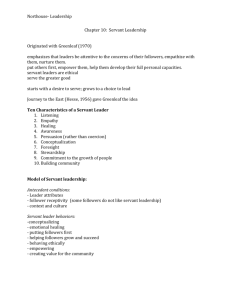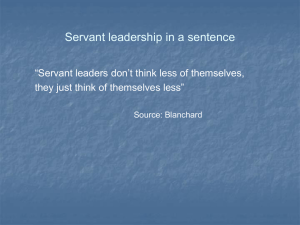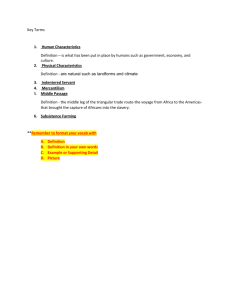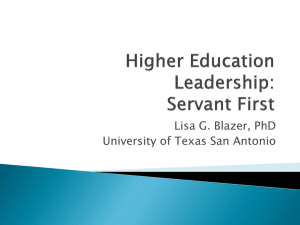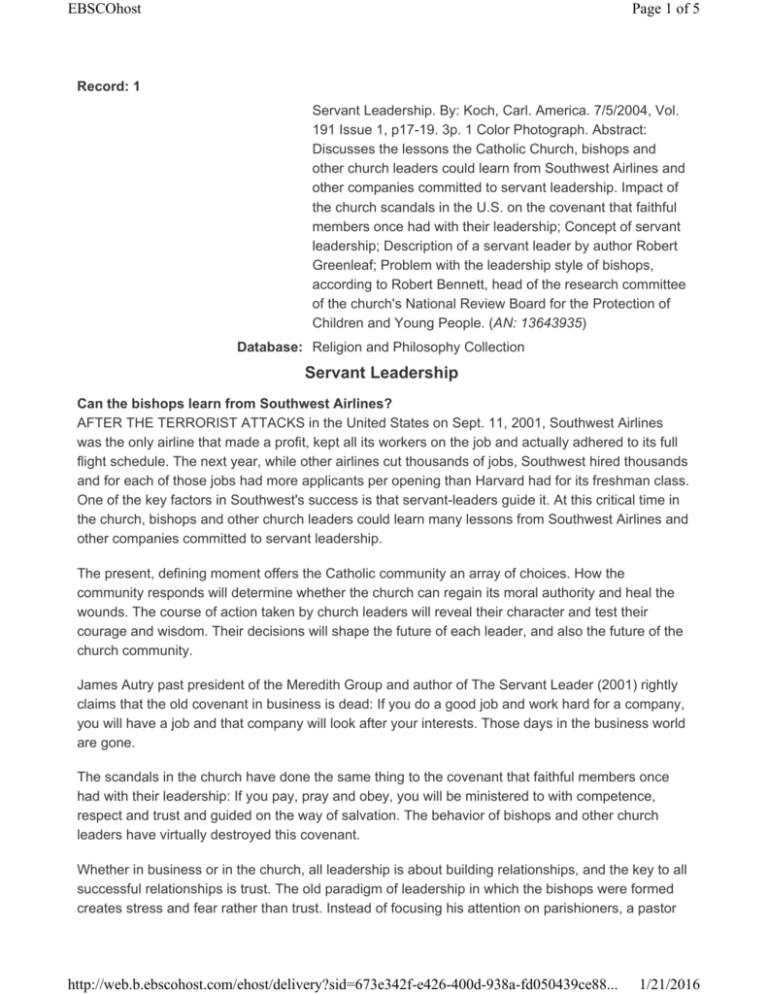
EBSCOhost
Page 1 of 5
Record: 1
Servant Leadership. By: Koch, Carl. America. 7/5/2004, Vol.
191 Issue 1, p17-19. 3p. 1 Color Photograph. Abstract:
Discusses the lessons the Catholic Church, bishops and
other church leaders could learn from Southwest Airlines and
other companies committed to servant leadership. Impact of
the church scandals in the U.S. on the covenant that faithful
members once had with their leadership; Concept of servant
leadership; Description of a servant leader by author Robert
Greenleaf; Problem with the leadership style of bishops,
according to Robert Bennett, head of the research committee
of the church's National Review Board for the Protection of
Children and Young People. (AN: 13643935)
Database: Religion and Philosophy Collection
Servant Leadership
Can the bishops learn from Southwest Airlines?
AFTER THE TERRORIST ATTACKS in the United States on Sept. 11, 2001, Southwest Airlines
was the only airline that made a profit, kept all its workers on the job and actually adhered to its full
flight schedule. The next year, while other airlines cut thousands of jobs, Southwest hired thousands
and for each of those jobs had more applicants per opening than Harvard had for its freshman class.
One of the key factors in Southwest's success is that servant-leaders guide it. At this critical time in
the church, bishops and other church leaders could learn many lessons from Southwest Airlines and
other companies committed to servant leadership.
The present, defining moment offers the Catholic community an array of choices. How the
community responds will determine whether the church can regain its moral authority and heal the
wounds. The course of action taken by church leaders will reveal their character and test their
courage and wisdom. Their decisions will shape the future of each leader, and also the future of the
church community.
James Autry past president of the Meredith Group and author of The Servant Leader (2001) rightly
claims that the old covenant in business is dead: If you do a good job and work hard for a company,
you will have a job and that company will look after your interests. Those days in the business world
are gone.
The scandals in the church have done the same thing to the covenant that faithful members once
had with their leadership: If you pay, pray and obey, you will be ministered to with competence,
respect and trust and guided on the way of salvation. The behavior of bishops and other church
leaders have virtually destroyed this covenant.
Whether in business or in the church, all leadership is about building relationships, and the key to all
successful relationships is trust. The old paradigm of leadership in which the bishops were formed
creates stress and fear rather than trust. Instead of focusing his attention on parishioners, a pastor
http://web.b.ebscohost.com/ehost/delivery?sid=673e342f-e426-400d-938a-fd050439ce88...
1/21/2016
EBSCOhost
Page 2 of 5
keeps looking over his shoulder to see what his bishop wants, and too many bishops hold a finger in
the air to see how the winds are blowing from Rome.
In a growing number of organizations, this old paradigm is being replaced, and for good reasons.
Supervisors were looking over their shoulders at the middle managers instead of helping employees
do their jobs well. As a consequence, the people most essential to making a business successful-the customers--were poorly served.
The companies known for excellent service, great value and loyal customers and employees replace
the pyramidal paradigm with a circle. The president empowers, supports and provides resources for
the vice presidents, who do the same for the managers, all the way to the employees who serve the
customers.
Leadership that emphasizes service first has come to be called servant leadership. Jack Lowe,
C.E.O. of the employee-owned construction company TDIndustries, remarks, "Trustworthiness,
which requires character and competence, can only flourish with leadership that trusts, supports and
encourages. At TDIndustries we call that servant leadership."
Servant leadership has its roots in the person of Jesus, the Gospels and the early church, a church
that collectively called forth its leaders. In his letter On Social Concern (1987), Pope John Paul II
wrote that "all systems of government are challenged to evaluate themselves in light of Gospel
values." "All systems of government" should include church government.
In this conversion moment, bishops should look to Southwest Airlines, Toro, TDIndustries and other
companies that have adopted servant leadership. Robert Greenleaf, in his book, Servant
Leadership: A Journey into the Nature of Legitimate Power and Greatness (1977), describes a
servant-leader: "The servant-leader is servant first. . . . It begins with the natural feeling that one
wants to serve, to serve first. Then conscious choice brings one to aspire to lead." The servant
leader makes "sure that other people's highest priority needs are being served. The best test, and
difficult to administer, is: Do those served grow as persons? Do they, while being served, become
healthier, wiser, freer, more autonomous, more likely themselves to become servants? And what is
the effect on the least privileged in society; will they benefit, or, at least, not be further deprived?"
Robert Bennett, head of the research committee of the church's National Review Board for the
Protection of Children and Young People, pointed out that servant leadership is not the style of most
bishops: "An individual bishop is virtually an absolute power; they are virtually unaccountable. I think
that this is a major cause of the problem. The exercise of authority without accountability is not
servant leadership; it is tyranny."
Any church leader needs to ask: How would Jesus lead? His answer is consistent: "If anyone wants
to be first, he must be the last and the servant of all"; "I am among you as one who serves"; "The
greatest among you must become like the youngest, and the leader like one who serves." Or
consider Jn 13:13-17. Jesus washes the disciples' feet and says, "I have set you an example that
you should do as I have done for you." If bishops or anyone else are to lead as Jesus led, they must
become servant leaders.
http://web.b.ebscohost.com/ehost/delivery?sid=673e342f-e426-400d-938a-fd050439ce88...
1/21/2016
EBSCOhost
Page 3 of 5
The word servant in these Gospel passages refers to the "Suffering Servant" passages in Isaiah and
means "slave of the king," a close advisor and confidant of the ruler, someone with great
responsibility. This servant must be a prophet and a healer. So Jesus and anyone claiming to lead in
his name hold responsibility and intimacy with be prophetic voices and healers of the community.
Only service and sacrifice will lead to the moral credibility and trust essential for leadership.
Servant leadership is hardly the model of leadership fostered in the church, especially in clerical
circles. Even the lexicon used for leadership betrays it as monarchical and militaristic, a leadership
style for feudal times, when the masses were illiterate peasants. We still call cardinals "princes of
the church," and some still live in palaces. Secrecy shrouds Vatican and diocesan finances and the
byzantine method of selecting bishops.
Our times invite church leaders to develop the 10 characteristics of a Jesus-like servant leader
described by Greenleaf: listening, empathy, awareness, healing, persuasion, conceptualization,
foresight, commitment to the growth of people, building community and stewardship. This list would
be an excellent foundation for the formation of priests, bishops and lay leaders for the church. Let
me comment on just three of the 10 characteristics.
Listening. To help people become freer, wiser and more autonomous, a leader must understand
them--done first through attentive listening. Ann McGee-Cooper, a management consultant for many
servant leadership companies, including Southwest Airlines, remarked, "The servant leader works to
build a solid foundation of shared goals by listening deeply to understand the needs and concerns of
others."
When Southwest Airlines entered negotiations with its pilots' union, Jim Parker, the C.E.O., sat at
the table. One of the pilots remarked, "The biggest complaint in the industry is that management
doesn't listen to employees. But you can't say that at Southwest. The top guy is in the room."
Servant leaders know that the success of their organization depends on trusting relationships built
on a foundation of respectful listening.
The epistle attributed to St. James admonishes, "My beloved, let everyone be quick to listen, slow to
speak" (1:19). This is sound advice for anyone in leadership, whether bishop or C.E.O., pastoral
associate or salesperson. Every seminarian and lay leader should have to complete intense training
in attentive listening, and new bishops should take refresher courses. If church leaders listened
better, perhaps there would have been no need to create Voice of the Faithful and Call to Action.
Persuasion. Larry Spears, director of the Greenleaf Center for Servant Leadership, says servant
leaders persuade "rather than using one's position of authority in making decisions within an
organization. The servant-leader seeks to convince others, rather than coerce compliance.... The
servant leader is effective at building consensus within groups." Servant leaders invite people into
dialogue and discernment because they realize that more good can happen in an organization with
the willing commitment of all organizational members. James MacGregor Burns put this point
succinctly: "Leadership mobilizes, naked power coerces."
http://web.b.ebscohost.com/ehost/delivery?sid=673e342f-e426-400d-938a-fd050439ce88...
1/21/2016
EBSCOhost
Page 4 of 5
In 1991, on the 100th anniversary of Pope Leo XIII's encyclical Rerum Novarum, Pope John Paul II
declared, "The Catholic church values democratic systems that ensure the participation of citizens."
But how many times have bishops reminded dissenting voices that the church is not a democracy?
How many dioceses have fought bitter wars against unionization? How many priests have been
exiled to the diocesan equivalent of Siberia because they raised discomfiting questions?
While condemning violence against women, the U.S. Conference of Catholic Bishops concluded:
"Domestic violence is any kind of behavior that a person uses to control an intimate partner through
fear and intimidation." But church leaders have often used fear and intimidation to destroy perceived
opponents, even the most faithful.
Stewardship. This arguably includes all of the other nine characteristics of a servant leader. In his
book Stewardship (1993), Peter Block says: "Stewardship is...the willingness to be accountable for
the well-being of the larger organization by operating in service, rather than in control, of those
around us. Stated simply, it is accountability without control or compliance.... Stewardship is the
choice for service. We serve best through partnership, rather than patriarchy."
Servant leaders give account and expect to be held accountable, because this is part of a mist
relationship. Sometimes the only way an account is given to the people by bishops is at the point of
a court order. Without open disclosure of information and involvement of the people of God in the
processes of church governance, no church leader can claim to be an accountable steward.
In addition, stewards empower others because they realize their interdependence with all humanity,
all God's creatures and the holy earth. Ken Melrose, the president of Toro, unselfconsciously names
Jesus as his model for leadership, and one of his core beliefs is: "The leader's role is to create an
environment...of trust [that] leads to more risk-taking, innovation, and creativity. The empowerment
to solve problems produces better solutions." By empowering employees, Melrose brought Toro
back from near collapse to strength. Empowerment is something that many church leaders could
learn from Toro and Southwest.
At this point in history we need to reclaim the church of Matthew 18. Michael Crosby, in The
Dysfunctional Church (1991), describes how Matthew 16 took center stage: "You are Peter, and on
this rock I will build my church.... I will give you the keys of the kingdom of heaven." This passage
propped up the old paradigm of leadership. Certainly Peter was a key figure in the early church, but
so were Mary Magdalene and James, Paul and Lydia: those gathered in Jesus' name--in the church
of Matthew 18.
In Mt 18: 18-20, Jesus tells his followers: "Whatever you bind on earth will be bound in heaven, and
whatever you loose on earth will be loosed in heaven.... For where two or three are gathered in my
name, I am there among them." Clearly, Jesus empowers the assembled believers: women and
men, old and young, poor and rich.
Crosby concludes: "When, for the sake of tradition, Peter's power to bind and loose is absolutized in
a way that subordinates the power of the other members of the church, the word of God itself can be
nullified in order to preserve abusive power patterns in the institutionalized church."
http://web.b.ebscohost.com/ehost/delivery?sid=673e342f-e426-400d-938a-fd050439ce88...
1/21/2016
EBSCOhost
Page 5 of 5
Now is the time for servant leadership in the image of Jesus to re-emerge in the body of Christ, to be
formed in all who aspire to leadership. But all who would aspire to lead first come as servants. And
may servant leaders remember to "be not afraid." Jesus goes before us.
PHOTO (COLOR): Bishop Wilton D. Gregory, then-Gov. Frank Keating of Colorado and Bishop
Joseph A. Galante at the U.S. bishops' meeting in Dallas, Tex., in June 2002.
~~~~~~~~
By Carl Koch
CARL KOCH directs the master of arts program in servant leadership at Viterbo University, La
Crosse, Wis., and coordinates programs at the Franciscan Spirituality Center, also in La Crosse.
© America Press Inc. 2004. All rights reserved. www.americamagazine.org
http://web.b.ebscohost.com/ehost/delivery?sid=673e342f-e426-400d-938a-fd050439ce88...
1/21/2016



